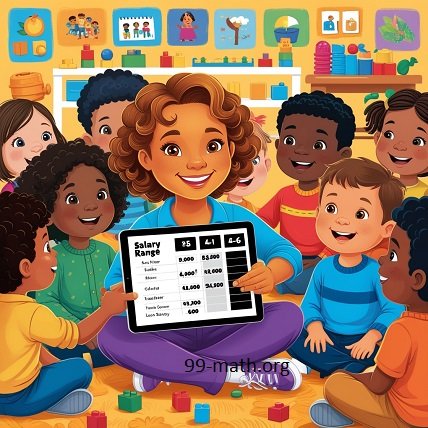Introduction
early childhood education salary is a fulfilling and important field that is vital to the early brain development of children. Early Childhood Educators (ECE) work with children from birth through preschool, setting the foundation for future social and academic success. Even while influencing young lives has inherent advantages, early childhood educators must take pay into account when making a professional decision.
What is Early Childhood Education?
The term early childhood education salary describes the official and informal instruction of youngsters up until the approximate age of eight. At this crucial juncture in human development, fundamental abilities, cognition, and moral principles are formed. Preschool instructors, childcare providers, child development specialists, and early intervention educators are a few examples of ECE professions. Through imaginative and planned learning experiences, these roles aim to promote the development of social, emotional, and cognitive skills.
Why Early Childhood Education is Crucial for Society
One cannot stress the value of early childhood education salary. Empirical studies repeatedly demonstrate the beneficial effects of early childhood education on children’s long-term academic achievement, social skills, and emotional health. It also lessens the probability of high school dropouts, welfare dependency, and criminal activity in the future. Therefore, ECE professionals are more than just caregivers; they are the designers of a society that is more prosperous and egalitarian.
Factors Affecting Early Childhood Education Salaries
early childhood education salary are complex and varied, influenced by a number of factors. One of the most important variables is geography; instructors in metropolitan or wealthy areas usually make more money than those in rural or economically disadvantaged locations. A person’s education and certification levels are also important; those who have a bachelor’s or master’s degree in early childhood education typically make more money than those who just have a high school certificate or associate’s degree.
Average Salary for Early Childhood Educators
early childhood education salary‘ typical pay varies based on their role and region. The U.S. Bureau of Labor Statistics (BLS) reports that in 2023, preschool instructors’ median yearly salary was expected to be around $32,000. But people who work in wealthy states or big cities frequently make a lot more money. For instance, teachers in places like California and New York could anticipate average annual earnings that are closer to $40,000.
Salary Differences by State
early childhood education salary‘ pay might differ significantly between states. Teachers in areas like New York, California, and Connecticut, where living expenses are greater, typically have the greatest incomes. Preschool instructors in California make an average of $38,000 a year, while those in New York can make up to $42,000. States like South Dakota and Mississippi, on the other hand, pay less, usually between $22,000 and $28,000 annually.
How Education and Certification Affect Earnings
The pay of an early childhood education salary can be significantly influenced by specialized certificates and higher education. Those who simply have a high school education or a GED usually end up working in entry-level jobs with pay ranging from $20,000 to $25,000 a year, such as teacher’s assistants or childcare providers. Early childhood educators with an associate’s degree can anticipate making between $25,000 and $35,000, while those with a bachelor’s degree can expect to make between $30,000 and $45,000.
Career Advancement Opportunities in Early Childhood Education
One of the most essential factors for people considering a career in early childhood education salary is career growth. Although beginning salary could be low, there are a number of ways to gradually raise income. Teachers may choose to pursue administration positions, such as managing daycare centers or preschool directors, where pay can vary from $45,000 to $60,000 annually. Specialization in fields such as early intervention or special education can also lead to higher-paying jobs, with annual wages frequently surpassing $60,000.
The Role of Public vs. Private Institutions
The pay and perks of an early childhood educator are highly influenced by the kind of organization they work for. Private preschools and daycare facilities typically offer lower pay and worse benefits compared to public institutions and federally supported initiatives like Head Start. Because public institutions are frequently funded by the government and have unionized workforces, they have more regulated pay schedules as well as access to benefits like health insurance and pensions.
Conclusion
The field of early childhood education salary has opportunities for both professional and personal growth. There are many chances for development, promotion, and higher earning potential even though the pay may not always be as great as in other professions. You may make well-informed judgments about your career path and how to optimize your salary in this crucial profession by being aware of the aspects that affect ECE salaries.
FAQ
Read more about: menshaircuts.net
What is the average salary for an early childhood educator?
early childhood education salary‘ typical pay varies according to their area, experience level, and educational background. But normally, it falls between $25,000 and $45,000 per year.
How can I increase my salary as an early childhood educator?
By going after advanced degrees, earning specialized certifications, moving to a higher-paying location, and getting more work experience, you can raise your wage.
Do early childhood educators receive benefits?
Indeed, especially in public institutions, a large number of early childhood educators have advantages like health insurance, retirement plans, paid time off, and opportunities for professional growth.

